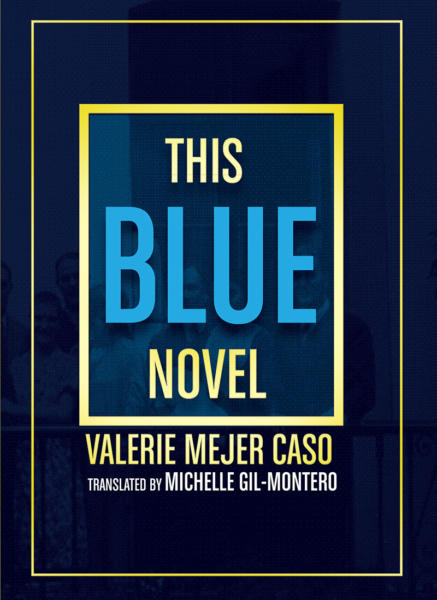
In this space, I seek to re-read This Blue Novel (by Valerie Mejer Caso and translated by Michelle Gil-Montero) through Fanny Howe’s “Bewilderment.” Howe’s concept of bewilderment as a poetic and political practice resists binary thinking, dwelling instead in an uncertain and continuous circumnavigation that aims to “settle with the irresolvable.” Bewilderment, “devoted to the little and the weak,” offers a flexibility, fluidity and simultaneity to word and to meaning that seeks to stand “outside” power and “under an undiscriminating sky.” Howe largely attributes bewilderment to women, children and subjugated people “who [rush] backwards and forwards within an irreconcilable set of imperatives.”
Throughout Howe’s essay, she presents symbols of spirals and gyres and mazes. Here, a reader can envision the dizzying space Howe seeks—a space sought not out of masochism but out of desire for discernment. Where does the clarity come from? The self is pushed to some threshold. For Howe, bewilderment is “an enchantment that follows a complete collapse of reference and reconciliability. It breaks open the lock of dualism (it’s this or that) and peers out into space (not this, not that).” To be bewildered is, as Walter Benjamin notes in “The Task of the Translator,” to be outside of the center. To be bewildered is to be foreign to the language one is surrounded by, to be incompatible, to instead be a circumnavigator. To be bewildered is to ask: where does the clarity come from? in an ever-crystalizing understanding that there is no answer. The centre cannot hold, Yeats writes, and Howe’s bewildered people live willingly within that slipping center.
In This Blue Novel, as Mejer Caso recalls her family and its dead, I see a project of slippery autobiography, a fevered gathering of artifact and memory. Not unlike Yeats, she writes, translated by Gil-Montero: I returned two years ago, and the house was gone. The house was gone, the centre cannot hold. Later, chronology itself is destroyed by the poet’s circling:
The order of events?
She was born and the minutes entwined:
a kidney-like knot.
This “knot”—a residue of the circling, a visceral loop. Mejer Caso is—with Gil-Montero, with Howe—bewildered. While the title This Blue Novel suggests the very dualism Howe pushes against, translator Michelle Gil-Montero cites a “slippery ‘thisness’” as essential to Valerie Mejer Caso’s project. Gil-Montero translates, with Benjamin, towards sense, opting out of the literal translation where esta becomes that. Gil-Montero insists on “particularity,” “the individuality of autobiography as a stream of single instances.” Here, the project finds its footing in a maze of “moments […] equally precise and unstable,” where the self is a “negative space” and translation “absolute otherness.” Even its postscript dwells in instability rather than containing the binary of before and after. As This Blue Novel closes, Mejer Caso and Gil-Montero suggest the constancy of circumnavigation: “From all sides, you can view the distance and also the past.”
AM Ringwalt is a writer and musician. Her words appear or are forthcoming in Peripheries, the Washington Square Review and the Bennington Review. Called “unsettling” by NPR and “haunted” by The Wire, she has performed her music at the Watermill Center and the New Yorker Festival. @amringwalt